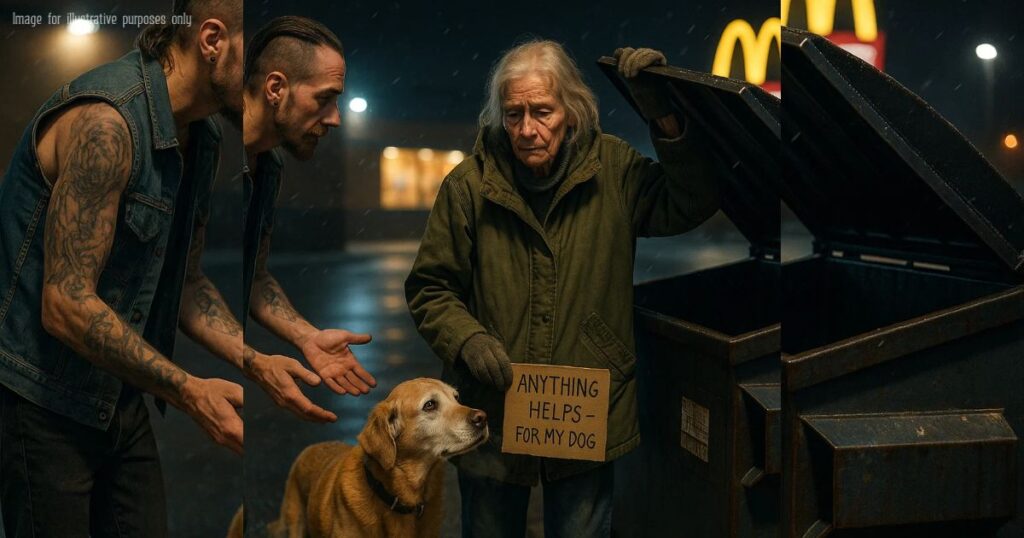We left in a little procession that felt like a promise: June’s truck in front, Mae riding shotgun with Lucky on a blanket between her and a crate of spark plugs; Rico and Caleb behind; me riding flank to break the wind.
People in the drive-thru lane put down their phones to watch us go.
No one honked.
Snow made its quiet decisions on the windshield and the world was softer for ten minutes.
At the clinic, Mae let June fuss with her paperwork while I bought a bag of dog food from the pharmacy tower because the universe has a sense of humor.
Lucky laid his head on Caleb’s knee, and something in the kid’s chest finally stopped clattering.
“You sure you’re okay?” Caleb asked Mae.
Mae studied his face the way she must have studied a hundred wounded boys.
“Do me a favor,” she said. “Sit up straight, put your hand right here on your chest, and breathe with me.
Four in. Hold four. Four out. All you have to do is count. Lucky will do the rest.”
They did. I watched the tightness leave him by degrees, like a knot learning it didn’t have to exist.
The motel room smelled like fresh paint and lemon cleaner.
There was a heater that clicked on without complaining.
June spread the blanket on the bed for Lucky and put the water bowl under the edge of the nightstand so paws wouldn’t send it sailing.
Mae stood with both palms on the dresser like a sailor who found land and wasn’t sure she had permission to step on it.
“Is it too much?” I asked.
“It’s enough,” she said.
Then she looked at me in a level way that made me feel fourteen again.
“Tank, did anybody ever tell your brother he did his best?”
“You just did,” I said, and finally let the answer land.
We left Mae with a bag of groceries, a list of numbers taped to the mini fridge, and the promise of breakfast the next morning.
Deputy Ward’s patrol car idled at the end of the lot. He didn’t get out. He didn’t drive away either.
Two weeks is not forever, but it’s longer than a night.
We used every hour.
Father Mike found a donor willing to cover a month in an efficiency that allowed pets.
Rico swapped labor for a discount—Mae stitched seat covers at the garage like she’d been doing it all her life.
June rode herd on paperwork until the appointment moved up and prescriptions stabilized.
Caleb showed up early for everything. He never said why. He didn’t have to.
On the first Sunday of the new month, Mae walked into the diner at the edge of town with Lucky at heel and a small paper bag in her hand.
She waited in line like everyone else.
When the teenager behind her shifted from foot to foot, hands empty, eyes tired, Mae pressed the bag into his palm.
“For your morning,” she said. “And for the friend you haven’t met yet.”
The kid didn’t understand. He will. We all do, eventually.
There’s a shadow box on the wall of that diner now. Inside it sits a white nurse’s cap, creased like a folded letter. Under the glass there’s a brass plate that reads:
In winter 2025, a medic asked for help for her dog. Riders answered. We don’t leave our medics behind.
Every Thursday we meet there for coffee and eggs.
Mae takes the booth by the window because she likes seeing people come in from the cold and change color.
Lucky naps under the table, paws twitching in a dream that’s not a nightmare. Sometimes a stranger will stand in the doorway, hand on the frame, trying to decide if they belong. Mae is always the one who looks up first and says what needs to be said.
“Come sit,” she tells them. “We’ll stand your shift awhile.”
You can’t fix everything.
The world is bigger than anyone’s reach.
But there is always the person in front of you, and there is always a warm thing you can place in their hands.
I think about my brother when I hand over a cup of coffee. I think about Mae when the door opens and the wind comes in with someone who needs five minutes of shelter and a human voice.
Maybe we’re not here to save everyone. Maybe we’re just here to make sure nobody has to stand alone in the snow with a note card that says more than any speech ever could.
Anything helps—for my dog.
Anything helps, period.


